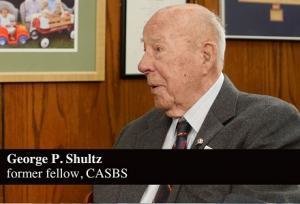
By the late 1960s George P. Shultz already was in mid-career stride.
He had earned a PhD in industrial economics from the Massachusetts Institute of Technology (MIT), taught at MIT’s Department of Economics and Sloan School of Management, worked as a senior economist on President Dwight Eisenhower’s Council of Economic Advisers, and served as professor and, eventually, dean of the University of Chicago’s Graduate School of Business. While there he became good friends with Milton Friedman and George Stigler, influential economists who both would win Nobel Prizes and had been fellows at the Center for Advanced Study in the Behavioral Sciences (CASBS) in the late 1950s.
In the fall of 1968 Shultz followed in their footsteps and arrived at CASBS as one among 44 fellows. As he told CASBS director Margaret Levi in a recent on-camera interview, his brief CASBS experience made a big impact on him. It reintroduced him to an important way of thinking.
In the video conversation with Levi and Ira Katznelson, president of the Social Science Research Council (SSRC) and CASBS board member, Shultz tells the story of then-CASBS director Meredith Wilson escorting him to his study (#13). Like all other CASBS studies, it had no phone. A buzzer would alert him of an incoming call, and he would have to walk outside to a shared booth to take the call. To make a call, Wilson told him to bring coins for an outside pay phone. When Shultz offered to pay for phone installation in his study, Wilson declined and simply said, “Try it. You’ll like it.”
Shultz caught on quickly.
“After a couple of weeks, it sort-of dawned on me that for the first time since I was a graduate student, I was working entirely from the inside out,” Shultz tells Levi. What I was doing every day was what I decided to do, not what some phone call provoked me to do. And I liked it.”
That’s not all. “Actually the lunches were pretty good,” says Shultz.
“They still are,” Levi replies.
Shultz’s fellowship at CASBS was cut short; he was called upon to serve as President Nixon’s Secretary of Labor in early 1969. He later served as director of the Office of Management and Budget as well as Secretary of the Treasury under Nixon. He then left government service to become executive vice president and then president of Bechtel Group. In 1982 he returned to public service under President Ronald Reagan and served for six-and-a-half years as the 60th U.S. Secretary of State.
Even as the nation’s top diplomat, he tells Levi, he implemented his CASBS lesson in practice at the State Department.
“[W]hen I was Secretary of State, I’d take maybe three-quarters of an hour…in the middle of the day somewhere…and say to my secretary, ‘If my wife calls or the President calls, put it through. No other calls.’ And I’d make a vow to myself not to look at my in box. And I’d go sit down in a comfortable chair with a pad and pencil, take a deep breath and say, ‘What am I doing here? What is our strategy? Where are we trying to get? How are we going about it?’ It was very helpful to me.”
Shultz draws a straight line to CASBS director Meredith Wilson’s simple advice in 1968. “This was my version of no telephones,” Shultz says, “and it helped me quite a lot.”
The story represents one of a few “offshoot” effects of the CASBS experience that Shultz recounts in the interview. He also describes his SSRC fellowship – field work undertaken in the Tennessee Valley region during the summer of 1941 while still a Princeton University undergraduate – as another “very formative experience.”
In the wide-ranging discussion with Levi and Katznelson, Shultz touches upon a number of topics of concern to him, CASBS, the SSRC, and society at large: governance in the context of diversity and inequalities, education, trust and credibility, collaborative problem solving, and the role of social science institutions – like CASBS and SSRC – in confronting problems of critical social importance.
Shultz sprinkles vivid, instructive anecdotes throughout the conversation – from a 1969 night on the town in Jerusalem with iconic mayor Teddy Kollek to 1980s relationship-building with Soviet foreign minister Eduard Shevardnadze – drawn from an illustrious career that continues today, at 96, in Shultz’s capacity as the Thomas W. and Susan B. Ford Distinguished Fellow at Stanford’s Hoover Institution. Most recently he is editor of Blueprint for America, published by the Hoover Institution.
SSRC president Katznelson makes note of the commitment of institutions that bridge the worlds of thought, policy making, and action, as well as provide a setting where interdisciplinary connections can occur and thrive. By the end of the interview both he and Levi couldn’t help but come away inspired by Shultz’s appreciation for the role of social science institutions like CASBS and the SSRC, as well as by the caliber of reasoned intellect that Shultz embodies.
“It’s so heartening to know,” said Katznelson, “that a person of your experience, achievement, and stature, has had this kind of robust relationship, not only with our institutions, but with other key institutions – universities, business, international relations institutions – that have shaped the prospects that you wish to advance as a scholar and as a statesman. So thank you so much.”
You also can view the video interview with George P. Shultz on the CASBS YouTube channel.
